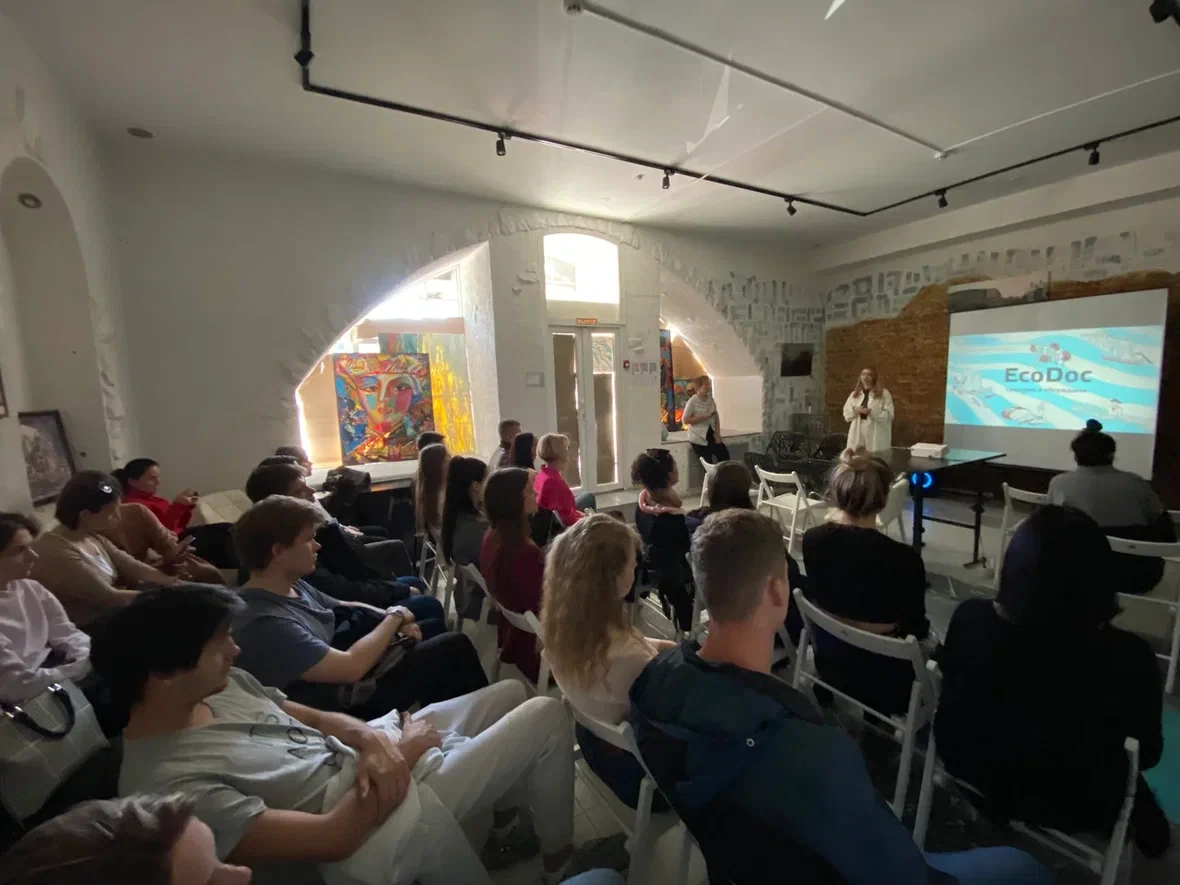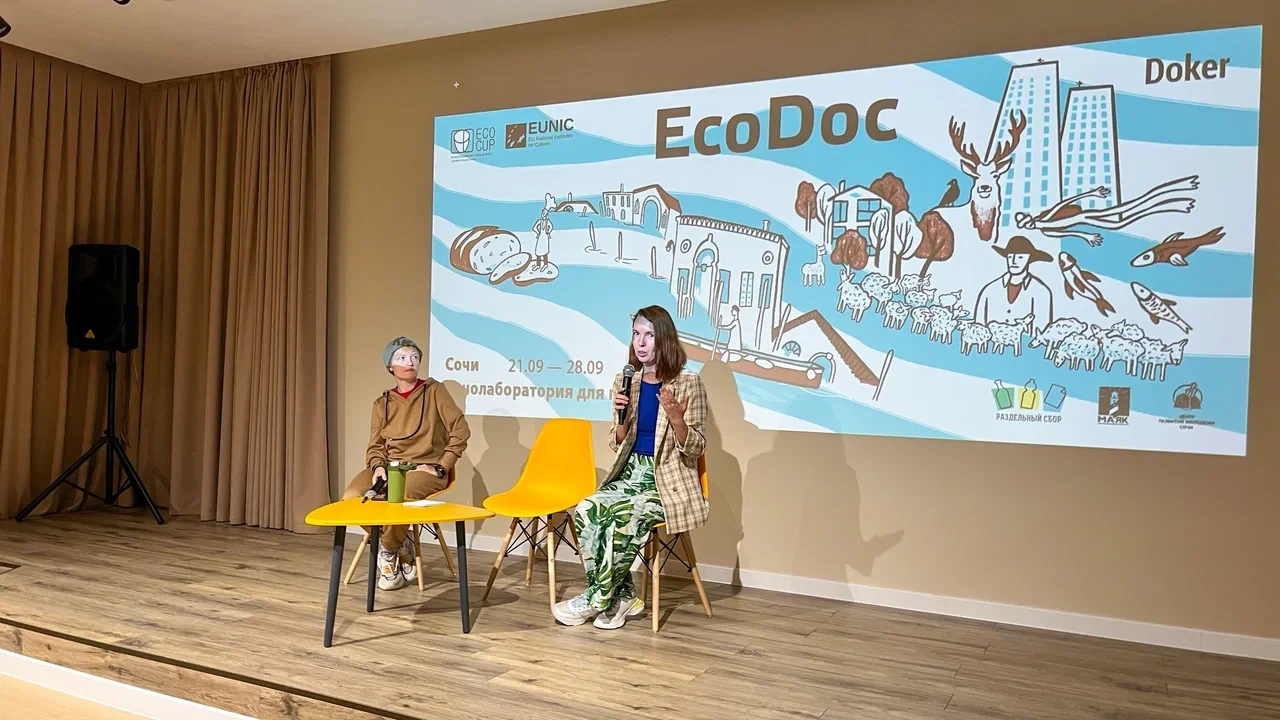The topic of sustainability is lacking attention especially in Russia’s regions due to little access to information, international expertise and opportunities for discussion and exchange. ECODOC addresses this need by networking with local initiatives and partners, and by providing access to international expertise and qualitative dialogue.
By networking with “Green Media”, local initiatives are given the opportunity to share information and connect with others on a Russia-wide platform. A video competition and documentary film lab enable young people to openly exchange ideas with experts and each other, test their talents and artistically process their own approach to sustainability.
EcoDoc 2022 included 20 film screenings in 4 cities of Russia. The films Bread (Austria, director Harald Friedl), No completely wrong life (Germany, director Michael Würfel), Sheep hero (Netherlands, director Ton van Zantvoort), Res creata (Italy, director Alessandro Cattaneo) and Lagunaria (Italy, director Giovanni Pellegrini) were shown in Barnaul (17-18 September 2022, Code art house with 179 visitors), Sotchi (7-9 October 2022, Galaktika cinema, with 211 visitors), St. Petersburg (14-16 October 2022, Normalnoe mesto (Normal place), with 215 visitors) and Moscow (19-20 November 2022, DK Rassvet, with 448 visitors).
Each film screening was accompanied by a public discussion with a local experts and introduced by a videostatement by the films’ directors. The topics were sustainable production and conscious consumption, sustainability of communities, challenges of sustainable farming, co-existence of people and animals, climate change and its effects. The viewers were locals of various age and gender, among them were ecological activists, scientists, farmers, students but also concerned citizens of all ages and professions.
In Sotchi a Documentary Film Ecolab for teenagers took place in the frame of EcoDoc 2022. From 21 to 28 September 10 local teenagers developed and shot 6 ecological films with the help of 2 tutors from our partners DOKer (International documentary festival Doker).
In May 2022, the first specialized environmental online media in Russia “Kedr” was launched. The aim of the platform is to strengthen the presence of "green" topics in the Russian public field and the media. More than 50 materials have been released on the platform in different genres: stories, research, interviews, expert columns, as well as videos. Since the launch of the "green platform", it has been visited by more than 35,000 unique users.
Impact
The audience of the film screenings and following discussions were able to enhance their knowledge on sustainability issues and ecological challenges, to gather experience from European experts by watching documentaries on sustainable production and farming, horizontal and ecological communities, ways of revising anthropocentrism in modern society. Through the discussions with experts they deepened their insights and also became aware of how fruitful an open dialogue on ecological challenges can be and that all society faces the same issues to be solved. The interest was high, a lot of questions on each film were asked and answered to.
The experts involved in the discussions became visible to the local communities and were able to establish new connections and strengthen their local networks; and the audience learned about them and their work (e.g. sustainable farms nearby).
The participants of the teenagers’ Ecolab were equipped with specific filmmaking skills and ecological knowledge, as well as profound ways of reflecting on and dealing with climatic challenges through documentary filmmaking skills.
The impact was measured by collecting verbal feedback from audience, experts and teenagers during the events.
All involved participants in the project stressed the value of sustainability dialogue in times of war: The discussions after the film screenings as well as the teenagers film lab were rare opportunities for open minded audience in Russia to gather, to exchange, to watch films and experts from abroad, to reach out to European values and representatives.
Challenges & Learnings
Due to the Russia’s war in Ukraine and the sanctions, all formats - except the media platform – had to be revised and adapted to the new political conditions. Instead of cooperating with renowned regional festivals with a wide audience the project decided to do small formats with independent, only non governmental partners and enabling a deeper discussion. The project had to skip the mobile screenings in little towns that were planned together with the regional festivals, but because of the political volatility this was not possible – instead the focus was put on cities where the project could rely on the support of local partners, in order to conduct the screenings and discussions. Instead of promoting the teenager’s lab via an open video call to reach a Russia-wide audience we communicated via our local partners only. The platform Kedr media is very successful due to the excellent networks of its makers.
Instead of working with renowned film festivals that are often supported by state funds, the project had to choose partners very carefully, several screening locations had to be changed because they were deemed as associated with organisations and personalities under sanctions.The partner EcoCup experienced additional challenges in organization through the unexpected departure of its employees and expert speakers fleeing from the repression and mobilization.
Feedback
Natalia Galechyan, Project coordinator in St. Petersburg (EcoCup, Normalnoje mesto):
“For me the project went surprisingly well. I didn't think anyone would come at all at this time. But people did come. At the last show there was full house. And this despite the fact that we did not use the media, because we did not want to stand next to war propaganda. All the speakers eventually came and spoke wonderfully. Although in the first days after the announcement of mobilization in the country, some of the speakers left, and some were not ready to speak. In the end, the discussions were as interesting as the films. People didn't leave after the screenings, but stayed until the very end. This was the first time I've ever had such a thing. As a rule, about 40% of the audience leaves during the credits. Personally, the discussion with the philosopher anthropologist after the film about humans and animals was especially important to me. It made me feel much better about what was going on in RF.”
Vladimir Epeshin, founder of the ecofarm Vesi (Gatchina, St. Petersburg region):
“Where does our strength come from to walk the unbeaten path? How do we manage not to lose our sense of purpose in this movement against the current? These and other questions were addressed to us at the festival of green cinema "EcoDoc", held in St. Petersburg on October 14-16 (at the "Normal Place", Sevkabel). One of the organizers, Natalia Galechyan, invited "Vesi" as an expert to a screening of director Ton van Zantwort's film about a sheep herder from Holland who feels at home on quiet wastelands, away from mercantile Western society. We saw how similar the problems of environmental projects there and here are: support from the authorities only in words, a persistent feeling that, at times, you are knocking on closed doors... We, as a farm, have not yet reached that line, and hopefully will not. We are very grateful for the experience of participating in such projects!”


